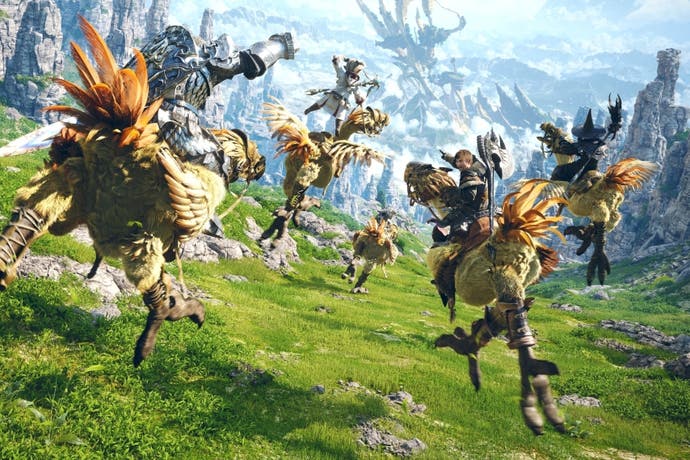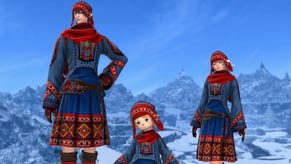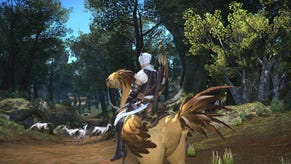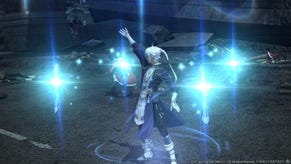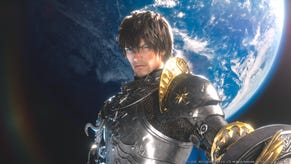Dispatches from A Realm Reborn
How is life in Final Fantasy 14's troubled paradise - and what does it say about MMOs?
A girl lies prostrate on the cobblestones. Her body is contorted in a way that implies complicated internal injuries. In these early days following Final Fantasy 14's relaunch, you often see these patient bodies: adventurers fallen in battle who, in the stiff grip of paralysis, await resuscitation. But Eorzea's emergency services are in crisis. There simply aren't enough healers around who have learned the ability to revive all the fallen yet.
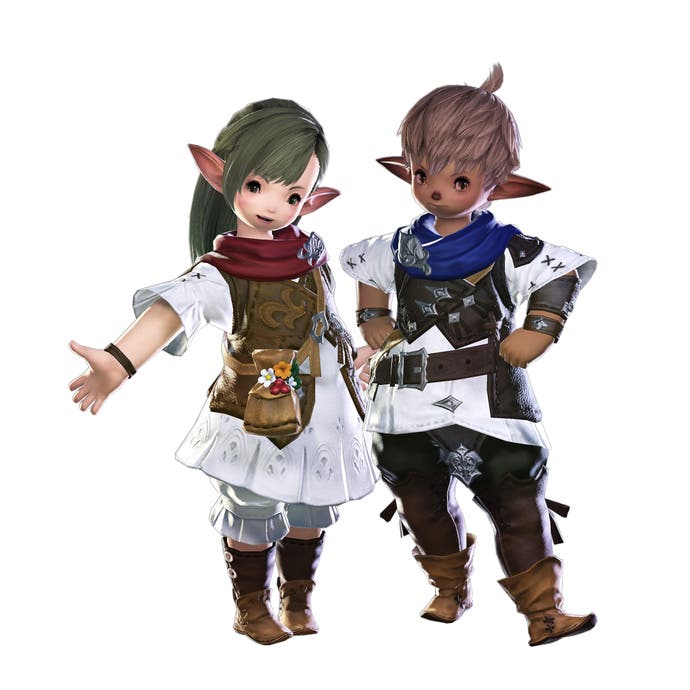
As a collapsed casualty, your options are limited. You can warp back to your chosen 'home' crystal - one of the towering blue shards that lunge into the stratosphere at the centre of each of the game's three major cities. You'll resuscitate there restored to full health, but such an airlift comes at considerable inconvenience. If you've fallen in a more remote region (and chances are you will have; the monsters near the cities are weedy and amicable) then the grim trek back can take up to 30 minutes. Alternatively, you lay back, watch the weather (and Final Fantasy 14 enjoys nothing if not tremendous weather) and wait in hope that some kindly mage might wander past and take pity on you.
I know how you feel, I think to myself, surveying her predicament. We've all been there, decked by a lumbering elm's mossy punch, or pecked to the ground by a nesting buzzard. In that moment I decide that, instead of merely walking by, I'll express some cordial consolation to the poor girl. Not particularly useful, perhaps, but kindness is the spice of virtual life, and besides, I'm tired of all that hitting and fetching that makes up the daily grind in this sort of game. I target her body and scan the list of emotes - animations used to express some kind of sentiment in the game.
Cry? No, that would be over-familiar. Fume? Too hot-headed. Salute? A little formal, perhaps. Upset? Ah, that's the ticket. An expression of 'upset' at my impotence in the situation seems entirely appropriate. After all, had I the ability to offer some sort of practical help, I almost certainly would.
I highlight the option and, with a click, my character turns to face the girl. Then, inexplicably and in what feels like terrible slow motion, he shakes his head at her in pure disgust. A moment's panic, then the icy realisation: Final Fantasy 14's writers didn't mean 'feel upset', but rather 'cause upset'. I may as well have opted to 'kick a woman while she's down'.
A lumpy silence hangs between us. After a while she types a single, wounded word into the chat box: 'why?'
I run away.
* * *
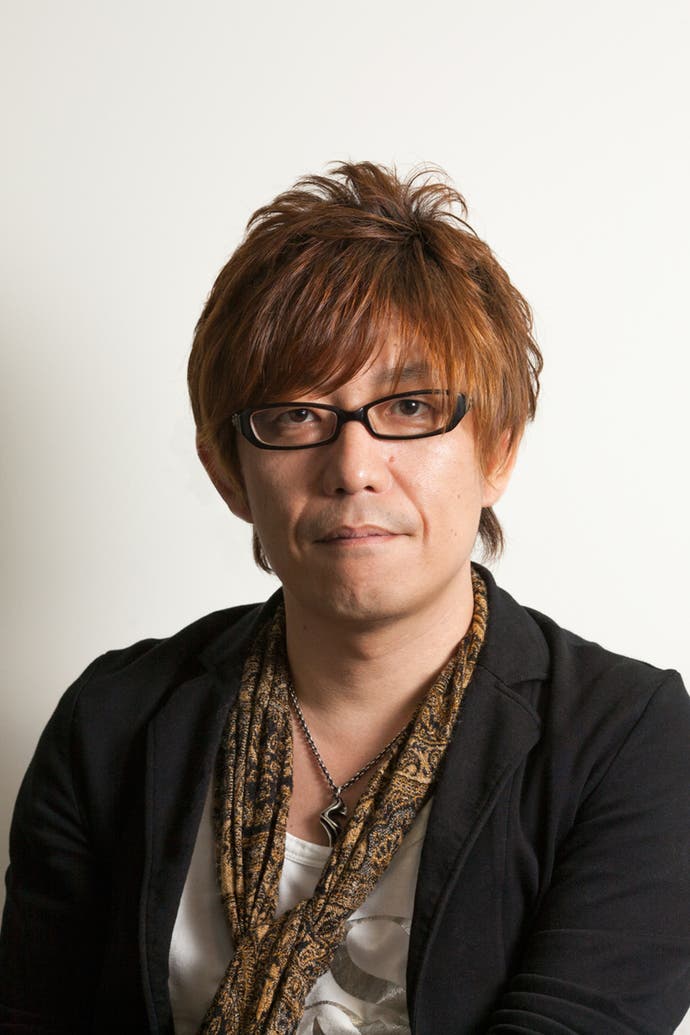
We have seen Japanese video game executives apologise during a press conference before; in 2011, Sony's ashen-faced executives bowed low and repeatedly like mechanical dolls in apology to the millions of PlayStation Network users, many of whom had their credit card details stolen in what remains an unsolved security breach. But when Final Fantasy 14's producer Naoki Yoshida addressed a roomful of fans and journalists in Tokyo last week, it was perhaps the first time a Japanese video game executive had openly wept on stage.
Few would doubt the honesty of his emotion. The producer was tasked with rebuilding the city of Final Fantasy 14, an online RPG levelled by critics and players following its 2010 launch and, in 2012, finally destroyed by its architects at Square Enix, after the company's president described the game as having 'greatly damaged' the Final Fantasy brand.
Yoshida has toiled for three years to rebuild the game from the ground up in the hope of undoing the damage. It's been gruelling work. And then there are the expectations. Even setting aside how much all of this cost - the extraordinary, unprecedented amount of human effort to turn a poor game of this size into a good one - Final Fantasy 14 is a colossal financial gamble.
In 2013, the blockbuster-sized, subscription-based massively multiplayer online RPG (MMO) appears done for. World of Warcraft's population continues to shrink while the megawatt Marvel, Star Wars and Star Trek IPs haven't managed to inspire enough people to emigrate to their respective servers in sustainable numbers. Final Fantasy 14 is not only battling its previous incarnation, it's also battling a seemingly indifferent market. Understandable that, days after the game's launch, Yoshida might stand alongside his team in front of the world's press and cry.
Are they tears of relief? After years of toil and expectation, he must feel the liberating sense of a sheer burden lifting. Or are they tears of exhaustion? Square Enix's 200-strong team - none of whom would have relished being dragged from their projects to work on fixing someone else's mess - has achieved in two years what has taken most other MMO creators closer to five; these humans must be spent.
A Realm Reborn's launch has been inconvenient for some and abortive for others. During peak times it can take hours of refreshing before you're able to connect and play
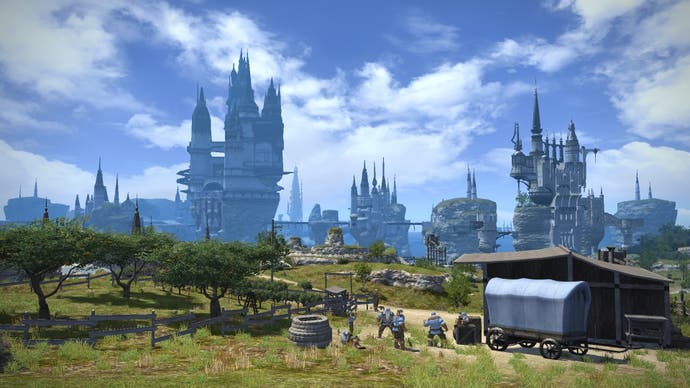
Or are they tears of grief? After all of that exertion, crowded servers have meant that this past week many players have been unable to create a basic character, let alone join the game world. A Realm Reborn's launch has been inconvenient for some and abortive for others. During peak times it can take hours of refreshing before you're able to connect and play. While those who make it to Eorzea's soil sing of Yoshida's victory (one forum user drolly put it as "polishing a turd and making a diamond"), for many others, the game is almost lost before it's begun.
Regardless, Yoshida's tears denote investment. This is not the sight of the detached Japanese manager, coolly presenting his cynical product to his customers. It is the sight of the dog-tired artist who has put all of himself into his work and, as a result, is now fully vulnerable, as that work is made fully public. Here is a man who has walked ten thousand miles, and is now ready for everyone else to do a bit of walking in his shoes.
* * *
Video game players are all travellers, of course. The machine's on-switch summons an on-screen portal through which we hurtle towards an Afghan frontline, a floating sky city, Wimbledon centre court, Mars, the Nürburgring or the Mushroom Kingdom.
But MMOs (an ugly initialism for an ugly descriptor that is destined, as the lines between single and multiplayer video games disintegrate, for redundancy) are closer to entire nations than destinations. They stretch and sprawl, tens of thousands of metres of landscape, populated by all manner of races and dialects. Visitors must abide by the game's laws, trade in its currency, speak in its language, solve its problems and chase its narrative threads within the invisible walls that describe its borders. But in contrast to most other games, which are prescribed and predefined, offering everybody much the same experience, in the best MMOs there are entire existences to be had, ones that barely overlap. You don't visit an MMO. You become its citizen.
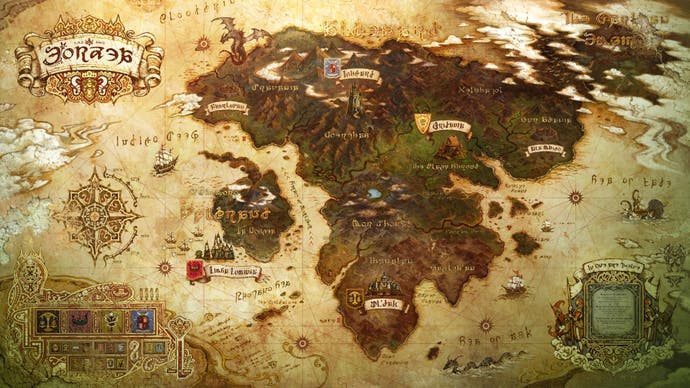
For example, here in Eorzea - a world that stretches across oceans, taking in forsaken savannahs, orderly farmland, boastful cities and salt-stained fishing villages - there's a spine of a story, the same one that all of the 250,000 simultaneous players currently logging on each day encounter. But the role you assume within that story is of your choosing: conjurer, baker, gladiator, fisherman, healer, jeweller, miner - you can switch vocation whenever you feel like it.
There are guild masters to study under, companies to join, items to purchase, pets to train, people to meet, dungeons to plunder; so much to do. Entire lives await here; endlessly appealing ones too, with their dependability and arch-fairness. Nobody's dealt a tough hand or forced to play the down-and-outer here in sunny Eorzea.
* * *
Nobody's dealt a tough hand or forced to play the down-and-outer here in sunny Eorzea

Not for the first time this week, I type an unprecedented question into Google: Where buy orange juice Realm Reborn?
The seaside port of Vesper Bay suns itself daily to work up a bronze on those fair bricks. It's no great surprise that Swyrgeim, a notably stylish, mercurial pirate, would end up in this lazy backwater, preening herself in its baking town centre. The first time I meet her, she calls out in dismay to comment upon my tasteless clothes. Bring me some orange juice and she'll set things right, she promises.
The drink may only cost 1 gil, but its value is, in this moment at least, immeasurable. Quite why the pirate needs orange juice so urgently is unimportant right now. The fact is that, if I deliver a vial to her, she will teach me how to dye my armour, allowing me to, for the first time, express a certain individuality through my appearance.
In a single-player game, you wouldn't bother. The trek to the shop in the forsaken desert to fetch the drink (sadly, my in-game culinary skills aren't yet developed enough to squeeze the oranges myself, and besides: 1 gil) would require too much time and effort. But here, where individuality is what marks one player from the next, the importance of being able to dye one's clothes seems anything but flippant. It's crucial.
* * *
Writing stories for video games is a fool's errand, as anyone who's tried it might tell you in a more honest moment. And never more so than in an MMO, a world without end, in which your story threads may never be fully resolved. Much like the scriptwriters who twist and toil through American television dramas, never knowing whether their characters or plot will prove popular enough to inspire a subsequent season, MMO scriptwriters must meander and digress, always postponing final resolution and prolonging the drama indefinitely.
So the traditional scriptwriting goals and arcs must be fudged in an MMO, story goals swapped out for an endless supply of short-term quests. Go here. Fetch that. Whack those. Collect these. The motivation for these errands isn't character development in the narrative sense, but rather character development in the mathematical sense: you're given small change (to spend on better equipment or more efficient transport) and a dollop of experience points (which eventually improve your character's statistics and unlock new areas or missions to pursue).
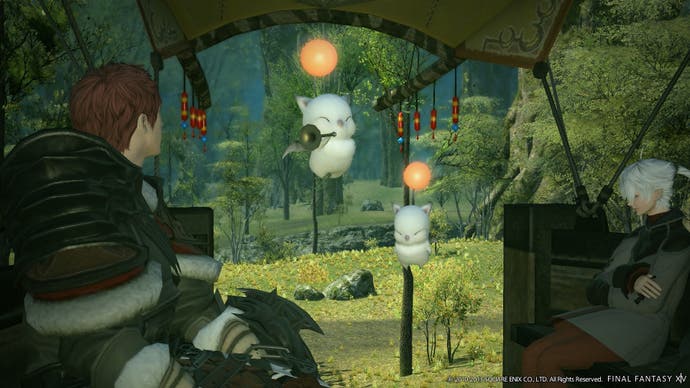
In Final Fantasy 14, there's a thin story: dignitaries to befriend, a nation to unite, a vague and distant antagonist. But the fiction is primarily delivered via the scenery and props. This rebuild is filled with affection for the series' much-loved history. It's fan service that extends deeper than the Chocobos, moogles, clothes, music, summons and familiar enemies, although these all reach back through the series with encyclopaedic, celebratory flair. Indeed, the Final Fantasy DNA is apparent in the game's knitted systems themselves, with a complicated but wonderfully flexible job system that allows players to mix and match abilities from different vocations - one first developed by the company in 1992's Final Fantasy 5.
But story? There isn't much of that, in the literary sense. Rather, your primary goal is of your choosing: to reach the highest character level first, to make friends or to show off.
* * *
I may not look ready to bludgeon any monsters, but I sure as hell appear prepared to strip for them. I mournfully downgrade to a pair of sensible trousers
Around level 21, I purchase a pair of what I presume to be leather trousers, an upgrade that increases my physical and magical defense by a welcome factor of three.
When I try them on it turns out they are leather chaps, cut off at the knee. I may not look ready to bludgeon any monsters, but I sure as hell appear prepared to strip for them. I mournfully downgrade to a pair of sensible trousers. Sure, the numbers are important, but then again, you never know who might be looking.
* * *
This is an MMO made by men, just like all of the others. It's about hunting and gathering, about power, prestige and showing off. Violence is always near, and it's inexhaustible. The true motivation for playing - at least, for those players hurtling through the game this first week - is the race to be first, to acquire clothes and minions that show off that mastery and establish the social pecking order. As I spend time away from the game I feel a low throb of anxiety about being left behind, about not keeping up with the Joneses.
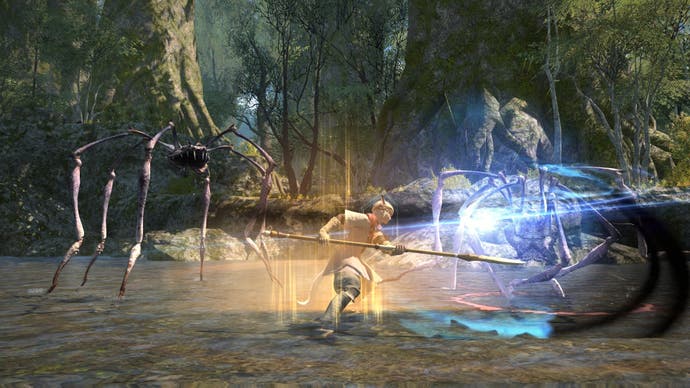
Is this how men would recreate the world, if given the chance, in their image: endlessly bloody, combative, peacocking? Status in an MMO isn't gained through kindness (there's no system to record how many times you answered a beginner's trembling questions, or gave out money to the in-game poor, or gestured kindly at a slain adventurer). It's gained almost exclusively through acquisition: either of clothes, equipment, subservient animals or levels. This is a genre issue (if indeed it's an issue at all), rather than one that's in any way specific to Final Fantasy 14, which is, server snags aside, a masterly execution of the contemporary MMO form.
Nevertheless, it says a lot about the way we view our world, about the natural way that we behave within an environment: mining nature for every last hide, trinket and drop of experience to further our own selfish goals. And what does the game say about me, about the choice I made, to play as a warrior, rather than a gardener or chef, to chase power and destruction over creation? All games reflect the circumstances in which they were created. Only ones as broad and generous as this reflect our own baser inclinations back at us.
* * *
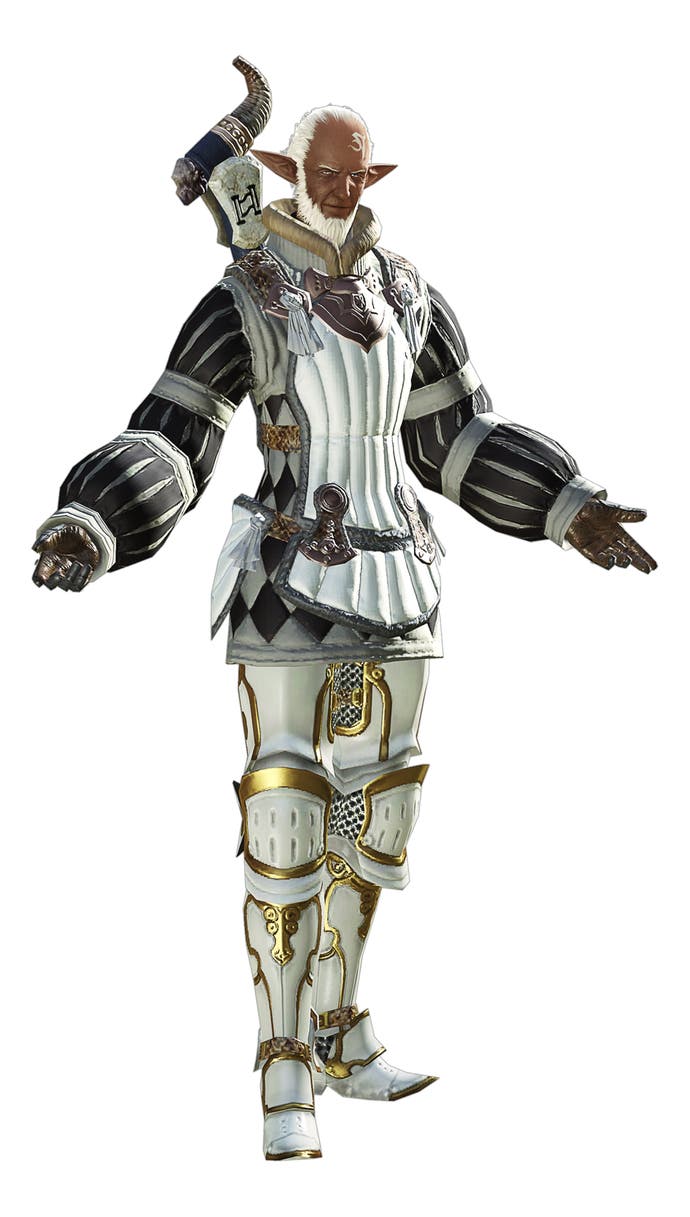
As well as the physical in-game journey that one goes on within an MMO, there's an emotional journey too. In Final Fantasy 14, this undulates in step with your progress through the game. The first 15 character levels, which introduce you to your chosen starting city, are feverishly exciting, as the designers pile new systems, ideas and a compelling breadcrumb trail of missions on you. The keen excitement of learning new things (the most potent spell in video games' repertoire) keeps you playing into the small hours, and draws your mind back to the world when you're away from it.
Then, having mapped out your starting region, fixed its denizens' small-time problems and dominated the locale fauna, you're granted access to the airship transport system, which can deliver you to the world's other two major cities. Your boundaries widen and, while there's a clear excitement at the potential of these unknown regions, there's also a sense of fatigue, of being lost or a beginner again away from the warm safety of your in-game adolescence, thrust into the wider world.
Progress is more slowly won now: each new level requires tens of thousands of experience points and the repetition of the underlying tasks you're required to complete begins to make itself felt. Then the designers press some new feature into your palms (dungeons: spin-off missions which must be completed alongside three other players, building a fresh sense of co-operation; mounts: animals you ride which become trusted companions on your journey; materia: magical gems that can be installed in slots on your armour and weapons to provide useful effects). Soon enough you realise the flexibility of Final Fantasy's class and job systems and begin to build a character of your own unique making. The fatigue and questioning ("is this just a colossal waste of time?") fades and you have renewed purpose. You begin to feel good about your life here.
* * *
The game designer Jonathan Blow once said that the MMO design exploits players. These games are, he said, "unethical". He described their "Skinnerian reward systems" as being "a sure sign that the core gameplay itself is not actually rewarding enough." His argument was that unearned rewards in games are false and meaningless and, as a result, many MMOs are vacuous and un-enriching. There's truth in that, of course, as anybody who has devoted hours of their lives to these fetch quests and dungeons will know, somewhere deep inside. But it's not the whole story.
MMOs take the covert appeal of all video games - their impeccable fairness and loyalty to the rules - and make a new world underpinned by that justice. Then, as they set us loose in this society, they offer a vision of a world in which, if we work hard, play by the rules, and do the correct things in the correct order, success is guaranteed. It's compelling, yes, but more than that, it's comforting.
MMOs offer a vision of a world in which, if we work hard, play by the rules, and do the correct things in the correct order, success is guaranteed. It's compelling, yes, but more than that, it's comforting
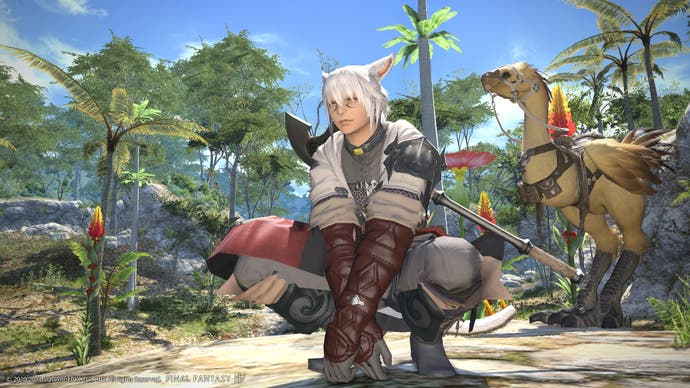
MMOs, being small nations, offer another existence, one in which, if we follow the map markers, complete the missions and do as the computer characters instruct, we're rewarded with success: wealth, status, adulation and mastery. Humans all have the sense that this is they way that real life should work, but so often it does not: we work hard but don't get the promotion; we love in vain; we exercise and eat well, but still become sick. Final Fantasy 14 isn't like that. Find yourself splayed out on the ground, felled by some monster, and there's always a second chance. There is nothing that you can do in this world to eliminate the opportunity for success. Life cannot be extinguished here. Progress cannot be lost. The only way is up, or out.
Final Fantasy 14 may be a rat race, but it's a rat race in which every rat can become king (or, at the very least, a level 50 paladin) and, just maybe, make a few real friends along the way. Looked at from this angle it's not so much a Skinner box as a paradise. And who doesn't want to live in paradise?
* * *
A few days later and I pass another girl - a rangy lancer, this time - lying prostrate and unblinking in the long grass.
This time I am too caught up in my own immediate clutch of errands to stop and stare. As I walk on past she issues a pleading SOS to the world over the game's chat box. The message, complete with co-ordinates to guide any would-be paramedic, appears: "Revive please. x25 y19".
For a while there is silence. Then, from some distant stranger, a reply: "Sure thing. I'll be there in three."
